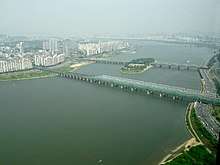Hangang Railway Bridge
The Hangang Railway Bridge (Korean: 한강철교; Hanja: 漢江鐵橋) crosses the Han River in Seoul, South Korea and connects Noryangjin Station and Yongsan Station.
| Hangang Railway Bridge | |
 Hangang Railway Bridge is in the front. Hangang Bridge is in the background. | |
| Korean name | |
|---|---|
| Hangul | |
| Hanja | |
| Revised Romanization | Hangang Cheolgyo |
| McCune–Reischauer | Han’gang Chǒlkyo |
History
In March 1896, King Gojong of Joseon granted the American businessman James R. Morse a contract to build a railway between Chemulpo (modern-day Incheon) and Seoul.[1] As part of the railway, construction of the bridge started in March 1897, but due to financial difficulties, Morse's venture was transferred to a Japanese consortium in May 1897.[2] Though the initial contract stipulated the construction of a walkway for pedestrians alongside the railroad tracks, the Japanese consortium finished the construction of the bridge in July 1900 without the walkway, citing financial burden.
The construction of the Gyeongbu Line in 1905 necessitated the construction of a second railway bridge, which was finished in September 1912. A footbridge, the precursor to the Hangang Bridge, was finished in 1917. A severe flood in July 1925 necessitated repairs, including the raising of the bridge by one meter.[3]
References
- Lautensach, Hermann (1988). Korea: A Geography Based on the Author’s Travels and Literature. Springer-Verlag Berlin Heidelberg. p. 464. ISBN 978-3-642-73578-3.
- "한강의 다리" (in Korean). National Archives of Korea. Retrieved 28 January 2019.
- "한강철교(漢江鐵橋)" [Hangang Railway Bridge]. Encyclopedia of Korean Culture (in Korean). Retrieved 28 January 2019.